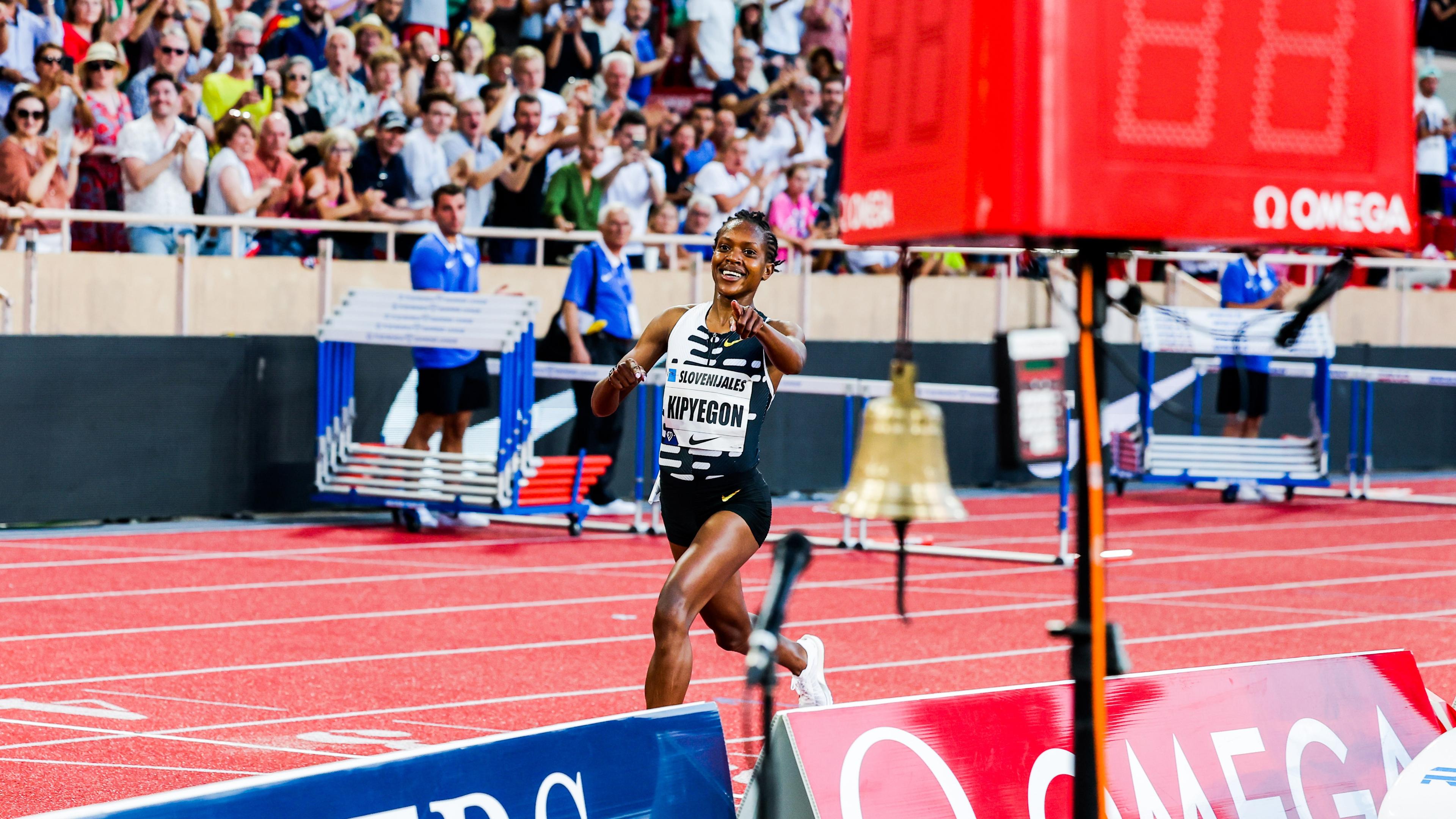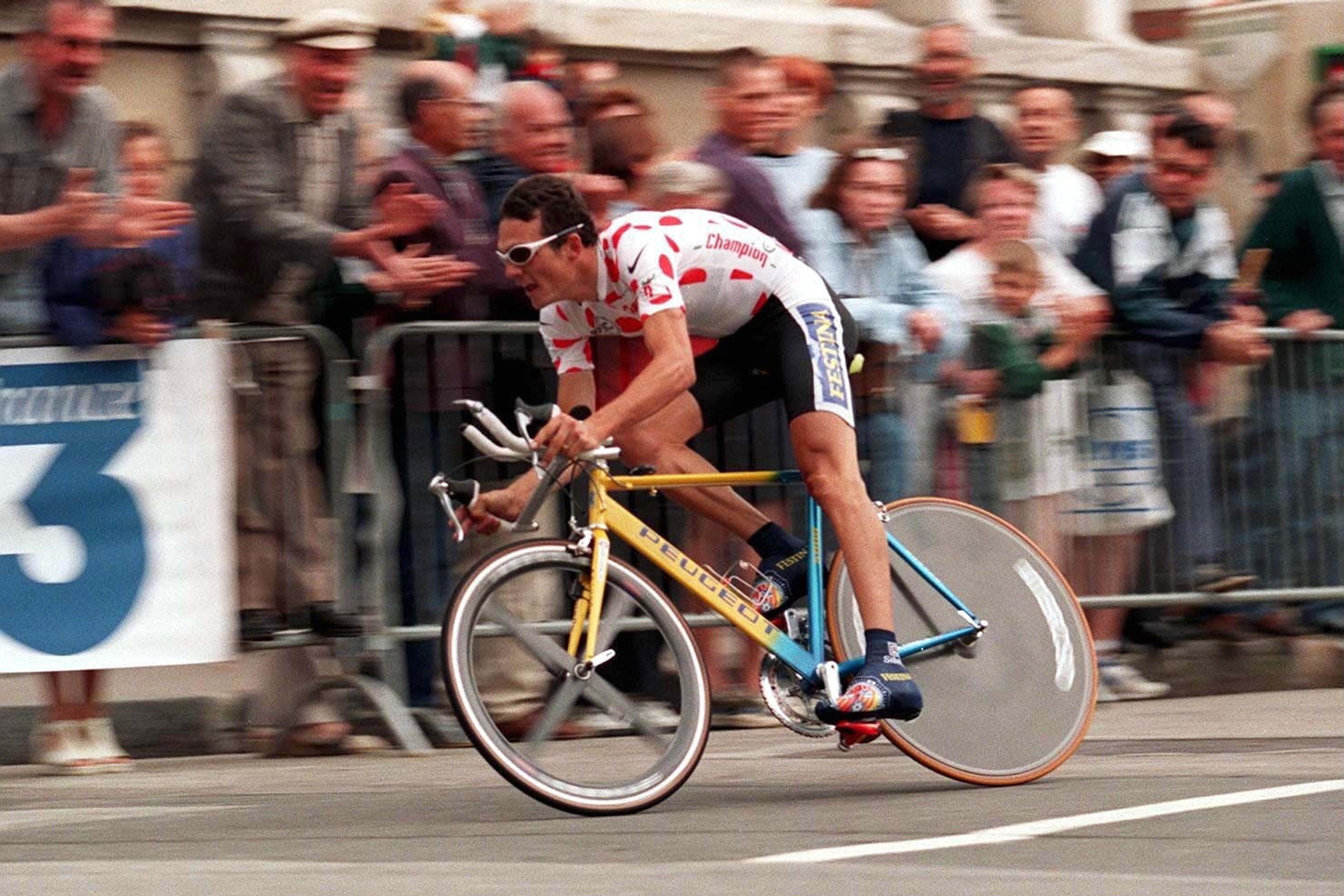If you’re following professional running right now, you’re noticing that decades-old world records are falling left and right. This summer, Faith Kipyegon smashed the women’s mile record by more than four seconds. Jakob Ingebrigtsen did the same to the two-mile distance, and then the 2,000 metres. Kelvin Kiptum broke Eliud Kipchoge’s already impossibly fast marathon world record in Berlin this October, coming within 35 seconds of the much-discussed two-hour mark. The cipher of the world record plunges us into historical appreciation for athletic achievement. Ingebrigsten’s doubling of the sub-four-minute mile recalls how Roger Bannister broke four minutes in 1954. The crackling energy of competition to reset the benchmark is sublime.
The benchmark is a literal mark, a number you must reach to be competitive, to distinguish yourself. Think about the leaderboard you follow if you’ve ever ridden a Peloton bike, those little numbers with your spot in there, subject to change by increased effort. Elite tracks are now equipped with running lights that show the world record pace alongside the racers, a controversial live-action benchmark that allows runners to strategise against historical race efforts. But benchmarks are not limited to sports. To get above water in school and business, you must get a certain grade, pass a test, prove yourself productive at work. All of these things are measured, boiled down to target numbers, and dangled before humans who must reach the threshold.
In fact, sports is perhaps the only area in our society where we tend to have a healthy relationship to the benchmark. Intelligence is too often reduced to a single aggregate number as a summary of learning, knowledge and value. Capitalism is a benchmark frenzy, constantly quantifying everything in the name of productivity gains.
The rise of the benchmark stems from the revolution in data collection that the philosopher Ian Hacking said began in the early 19th century. He called the exponential increase of data an ‘avalanche of numbers’, gathered about nearly every aspect of life that took off in the period 1820-40. By the end of the 19th century, human bodies were being measured for racial and ‘intelligence’ clues, following Sir Francis Galton’s conviction that physical attributes were the measure of ‘normal’ humanity and mental capacities. By the early 20th century, even as this ‘scientific racism’ was being challenged and discarded from inside the scientific establishment by figures like the anthropologist Franz Boas, a single score emerged to measure intelligence as such. Although IQ, the ‘intelligence quotient’, has never been able to shake off its racist past, it remains a tool of assessment and sorting. The public polemics between the ‘race-realist’ Charles Murray and his chief critic Stephen Jay Gould in the 1990s have come to haunt us again in the form of ‘eugenicons’ (eugenic conservatives) who see genetic destiny reflected in the intelligence benchmark. This is not just a pseudoscience of intelligence, it functions as a framework for self-understanding too. It offers a suffocating vision of society that has us all walking around with numbers on our foreheads, reduced to a score.
The reign of the standardised test has contributed to treating human intelligence as a score. Everyone knows their SAT score. As Annie Abrams has documented in Shortchanged (2023), the Advanced Placement programme in the United States allows students to skip parts of their college educations if they get a ‘5’. When human intelligence is just a number, it’s easy to see why we might think that machines are intelligent too. AI’s recent explosion proceeds almost entirely by the numbers, with data science driven by benchmarks for specific tasks in machine vision and language use. A benchmark-driven research environment permeates academia, where data science is on the rise. Its spread blurs the difference between insight and quantification.
Today, humans and machines encounter each other as intelligence scores, fighting a battle in which intelligence has become an arms race. The rising influence of cognitive science, in which intelligence is just a series of benchmarks, obscures social factors for success. No wonder that AI applications skew heavily in the direction of eugenics, reviving legacies of scientific racism. But the problem isn’t limited to the racism that results from this type of benchmarking. The problem goes deeper, to the way benchmarks themselves work at a social level.
The benchmark is not by itself useful to determine what that performance means
The benchmark can be seen as a kind of index. The pragmatist philosopher Charles Sanders Peirce broke down reference – the way that signs designate something – into three functions: the icon, the index, and the symbol. The icon, like the little graphical ‘folders’ on your computer desktop or a portrait, is like the thing it refers to. The symbol is not at all like the thing it refers to: the sign ‘r’ tells me to make its sound only by convention; the sign ‘4’ has nothing to do with fourness. The index points. Like a weathervane showing you the direction of the wind, the pointing finger we label simply the ‘index finger’ tells you what it means by showing you rather than telling you. A benchmark is a symbol, since it is a number – eg, Kipyegon’s 4:07 mile. But it is also an indication, of the surpassing of a mark (Sifan Hassan’s previous record of 4:12). Think of the marks laid out in the sand or on the field for the long jump or the javelin throw. Yes, they are set at a numerical distance, but they point us to the record. To get past the benchmark is to prove remarkable ability.
Indexical reference is foundational. Peirce thought that no concrete messages of any kind could be communicated without it. But, stripped of its symbolic or iconic flesh, it produces tunnel vision. The benchmark is useful in knowing how an athlete, a mind or a policy performs. It is not by itself useful to determine what that performance means. That lack of a fuller perspective becomes a problem in trying to understand social and political life.
Because of the ideology of the benchmark, those who ‘win’ – especially in business – become intellectual champions. Billionaires make up a new ‘intelligentsia’, even though their achievements are often the result of contingencies, luck and generational wealth. The media turn to the ultra-rich for perspective, turning the ninth zero in net worth into a benchmark for wisdom. A visceral feeling that this is wrong, that bank account statements do not equal intelligence, does not prevent this from happening. The ideology of the benchmark fulfils Slavoj Žižek’s definition of ideology. Where ideology is usually seen as deceit – along the lines of the Biblical comment ‘they know not what they do’ – Žižek emphasises its power to act even when we are conscious of it. It is not hard to see that the rich are not unusually intelligent. This is why Žižek’s formula for ideology applies: We know very well what we are doing, but nonetheless we continue to do it. The collective ‘we’ accepts the billionaire class as especially smart, even if there is clear consciousness that this isn’t so. The benchmark here is the 10th zero in one’s bank account, an index that acts as an ideological proxy for intelligence. Numbers don’t tell the whole story. But it’s hard to tell a better one.
Benchmarks are sticky. They mean something, and it is not so easy to opt out of their logic. This allows the group that the historian Quinn Slobodian calls ‘market radicals’ to promote a ‘freedom index’ to describe favourable conditions for capitalism in the absence of democracy. It is no accident that the freedom index is an index, giving single-number scores to countries that strip governmental context from allegedly ‘pure’ capitalism, which for them equates to freedom. ‘Innovation’ and ‘optimisation’ follow the logic of contextless benchmarks that tell us our society is achieving unheard-of heights while roads, bridges and the social contract decay.
Recently, Courtney Dauwalter won her third Ultra Trail du Mont Blanc marathon, a 106-mile race through three countries in the Alps with more than 32,000 feet of elevation gain. It was her third major ultra win of summer 2023, after Hard Rock 100 (Colorado) and Western States 100 (California). In a golden age of sports, Dauwalter might be the most impressive of all. She runs unconventionally, training without specific mileage every day, and is smashing records not by seconds but by hours, even as women’s ultra-marathoning is getting more competitive. She’s a walking advertisement for the type of running she describes – even though it puts you in a ‘pain cave’, as she calls it – because she makes it all about community. Even after hundreds of gruelling miles over days of running, she never fails to point to the labour, the crews, and the fun of the sport. Dauwalter is hitting benchmarks no one thought possible – she’s quietly the biggest thing in sports right now – but she never lets that block out the rest of the picture. She actively tunes you in to the aesthetics of trail running, and of athletic achievement more generally.
A necessary condition of a good society is the willingness to accept imperfection in the results of collective effort. The epistemology of the benchmark prevents us from doing this crucial imaginative work, from seeing that great achievement is conditioned and allowed by collective sacrifice. Sport and fandom don’t narrow our vision in this way – and thus devalue the labour and context of any achievement – but still allow us to celebrate that achievement.
Intellectual achievement is beautiful too, but it should serve society, not split it apart. The ability to make a computer use language is sublime, just like a world record in running.
We should cheer on and appreciate the heights to which we are capable of rising intellectually and allow ourselves a collective sense of satisfaction in them. For that to occur, in Peirce’s terms, symbolic flesh must be put back on the index. Dauwalter offers a way forward, reminding us that under every index, every grand number that falls to achievement, lies a vast social effort in which we ground our judgments. Running models an aesthetic stance to achievement that celebrates progress without stripping it of its context. We should treat intelligence the same way, and we will be happier.








